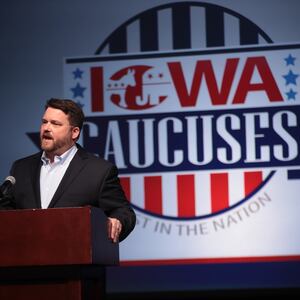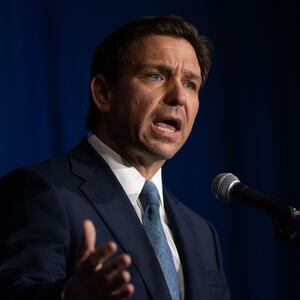Welcome to Trail Mix, a fun but nutritious snack for your election news diet. See something interesting on the trail? Email me at jake.lahut@thedailybeast.com.
This week, we get into the drama behind the presidential primary calendar and how that might throw a wrench in the soon-to-be Ron DeSantis campaign’s strategy. We also catch up with the New Hampshire lawmaker who went viral for double-endorsing Donald Trump and DeSantis.
One tiny problem with that Iowa strategy
In a normal presidential campaign, going all-in on Iowa—historically the first state to award delegates in a primary—would be a pretty reasonable and entirely conventional strategy.
Enter Ron DeSantis, who is set to follow a long line of White House hopefuls who pin their hopes on Iowa.
To upset Donald Trump for the 2024 GOP nomination, the Florida governor is preparing to allocate a massive amount of resources to a superior performance in the Iowa caucuses—going so far as to reportedly consider visiting all 99 of the state’s counties.
The problem is, Iowa may not even end up going first.
Thanks to the Democratic Party’s new primary calendar and confusion around how a Republican-only caucus night would play out, Iowa is at risk of being surpassed by New Hampshire.
The development that would alter decades of political tradition. And it would also alter DeSantis’ grand plan to win the nomination,
While Iowa will likely be important for the GOP no matter what, if it is not first—a status that offers DeSantis an opportunity to re-order the momentum of the race or knock Trump off balance—his strategy may look unwise in retrospect.
The bulk of DeSantis’ state level endorsements thus far have come from Iowa and, as The Messenger reported, his Never Back Down PAC has a $10 million budget for caucus field operations to support a staff of around 80 people working full and part-time.
What’s more, DeSantis’ reported goal of racking up delegates in large states that vote late in the primary calendar—the same strategy Ted Cruz tried in 2016—begins to fall apart without the Iowa springboard kicking things off, a GOP strategist unaffiliated with any campaign told The Daily Beast.
While the DeSantis team has signaled they will also have a major presence in New Hampshire, there aren’t as many specifics on an investment target or details on the frequency of possible visits from the governor.
Still, the GOP strategist cautioned, a shakeup to the voting order might be the least of DeSantis’ problems given his record of taking on Trump so far.
“Nothing works in terms of landing gloves on this guy,” they said. “I just have not seen anybody ever in a Republican-on-Republican setting land a blow to Trump since 2015.”
It’s still unclear how exactly the primary calendar might shake out. But New Hampshire Secretary of State David Scanlan told The Daily Beast it’s entirely likely his state will vote before Iowa at some point in the first three weeks of January 2024.
“I mean, New Hampshire has a state law that says that our presidential primary will be held at least seven days before a similar event,” Scanlan said. “So we will be watching what other states are doing, including Iowa, in terms of their presidential preference nominating event, and as things become clear, we will act accordingly.”
The operative phrase there is “similar event.” While Iowa and New Hampshire each take their early voting privileges very seriously—and guard them ferociously—their different systems have produced an uneasy truce.
In Iowa’s caucus system, delegates aren’t allocated through direct votes but a more complex process forged through in-person interaction. New Hampshire votes with old-fashioned individual ballots.
But in Iowa, whose caucus system crashed in dramatic and embarrassing fashion in 2020, Democrats might be changing their procedures, moving ahead with a “caucus by mail” push instead of the in-person process of determining winners at precinct caucus meetings around the state.
If Iowans allocate delegates not by huddling inside of a high school gym but with ranked choice ballots sent in the mail, Scanlan said the proposal sounds a little too close to a primary for his liking.
“If the Iowa Republicans and Democrats keep their traditional caucus format, we will respect that,” Scanlan said, declining to provide a more specific window for potential dates.
If not, New Hampshire would move its primary ahead of Iowa’s, even if Republicans in Iowa keep their procedures the same.
Republicans hold majorities in both chambers of the Iowa state legislature, and the state GOP has warned that the state Democratic Party’s proposal to provide “presidential preference” by mail would effectively destroy what’s left of the first-in-the-nation caucus.
Republicans in the Iowa legislature passed their own version of a New Hampshire law enshrining first-in-the-nation caucus status, but because the parties decide the dates, there could be legal challenges, other Iowa Democrats have warned.
Representatives for the Iowa GOP did not return a request for comment.
Iowa Democratic Party Chair Rita Hart backed the party’s plan to hold both in-person and mail-in voting in a statement to The Daily Beast, saying she’s “committed to doing what’s best for Iowa” by “moving forward with the most inclusive caucus process in Iowa history.”
Scanlan, meanwhile, remained adamant that the state will hold the first primary, no matter what.
“New Hampshire has faced challenges to the presidential primary dates and our tradition of going first on a regular basis,” he said. “This isn’t the first time we’ve had a challenge, but this may be the strongest.”
While DeSantis might have time to change course should clarity come soon on the primary calendar, New Hampshire Republicans aren’t holding their breath.
“DeSantis defines his own environment,” a top New Hampshire Republican told The Daily Beast, noting there have been continued concerns he won’t visit the state very much.
The presidential primary veteran didn’t mean it as a compliment, adding that the governor “makes it what he needs it to be in order to be successful,” and may benefit more from a hearty field investment in Iowa rather than pressing the flesh himself in New Hampshire.
As long as the order stays the same, that is.
Complete and Total Endorsement News
New Hampshire—population 1.4 million—has a staggering number of state lawmakers: 400 in the state House and 24 in the state Senate, making it the third largest legislature in the English-speaking world.
Every four years, these very much citizen legislators—not to mention scores of mayors, town selectmen, and other local notables—are heavily courted by presidential campaigns looking for a primary win. And every four years, reliably, some weird stories result.
This week, GOP state Rep. Juliet Harvey-Bolia went semi-viral after NBC News reported she had endorsed both Trump and DeSantis.
The Daily Beast caught up with Harvey-Bolia after the flap to talk through her decision—or lack thereof.
She said she plans on sticking to it, at least for now.
“I’m in the middle of a big legislative week,” Harvey-Bolia said, repeatedly mentioning that she makes only $100 per year as a state lawmaker. After the state legislative session ends on June 30, she said she’ll start re-examining both candidates.
Harvey-Bolia—a former station manager at a public access channel who became involved in state politics over reopening schools in the pandemic—was one of four lawmakers who ended up on both the Trump and DeSantis endorsement lists. One of them, state Rep. Lisa Smart, recanted her support for DeSantis, while two others ostensibly count as genuine conversions from the Trump to DeSantis column.
Both Trump and DeSantis camps reached out directly, Harvey-Bolia said, after the NBC story dropped. But she declined to share what either side told her.
At least one important factor may not be at play for Harvey-Bolia’s ultimately exclusive endorsement: asked if she’d consider rescinding her support of Trump if his legal issues mount, she said she couldn’t comment.
Image of the week
Stay gold, former Vice President Mike Pence. Stay gold.
Polling station
A new study from the data analytics firm Catalist provides a sharper empirical look at who’s making up the party coalitions in the Trump era.
It has a few counter-intuitive findings from the 2022 midterms, including that Democrats actually held up better among non-college educated white voters compared to those with a degree, a demographic in which the party suffered a drop-off from 2020.
The other key finding was that Democrats performed better with non-college educated voters—a key weakness in their coalition and the driving force behind Trump’s victory in 2016—when the races are perceived as competitive.
Campaign lit
Pure Sinema. Deputy Politics Editor Sam Brodey pieces together Sen. Kyrsten Sinema’s pattern of paying for her personal marathon travel with campaign funds, raising alarm bells among campaign finance watchdogs.
Tallahassee Trust. Politico’s Jonathan Martin dives into how the DeSantis team thinks they can actually beat Trump and ramp up a competitive campaign.
DeFuture is Wednesday. The DeSantis campaign is expected to finally go live on Wednesday at an event in Miami with guests expected to sport “dressy casual resort wear,” according to Marc Caputo of The Messenger. Notably, DeSantis operatives have been “‘leak-testing’ by intentionally giving out false dates and information to see if it goes public.”
More knives out for Santos. Rep. George Santos (R-NY) wasn’t just ripping off donors, but also fellow Republican candidates, The Daily Beast’s William Bredderman reports.
Varsity Blues. Saint Anselm College, which hosted Trump’s CNN town hall, has been dealing with continued pushback from students over the event, leading officials to release a statement, Paul Feely reports for the New Hampshire Union-Leader.










